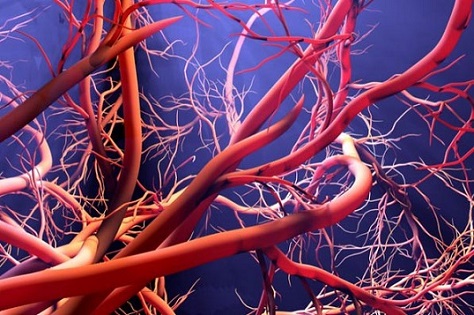Nikhil Prasad Fact checked by:Thailand Medical News Team Jul 23, 2024 1 year, 4 months, 3 weeks, 5 hours, 25 minutes ago
COVID-19-News: The Impact of SARS-CoV-2 on Blood Vessels
A recent study has uncovered alarming details about the effects of the SARS-CoV-2 virus, specifically its spike protein, on human endothelial cells - the cells that line blood vessels. Researchers from Universidad Autónoma de Madrid-Spain and their collaborators found that the spike protein can induce premature aging in these cells, leading to potential long-term cardiovascular issues. This
COVID-19 News report explores the findings and implications of their research.
 SARS-CoV-2 spike protein accelerates aging of blood vessels
What the Study Revealed
SARS-CoV-2 spike protein accelerates aging of blood vessels
What the Study Revealed
The study findings highlighted that the spike protein of SARS-CoV-2 could directly trigger endothelial cell senescence - a process where cells stop dividing and start secreting harmful substances. This phenomenon is a significant contributor to cardiovascular diseases and is observed in both acute and long COVID-19 cases.
In primary cultures of human umbilical vein endothelial cells (HUVEC), the researchers observed that the spike protein increased markers of cellular aging and DNA damage. These markers included senescence-associated-β galactosidase, γH2AX, p53, p21, and p16. Additionally, the spike protein reduced levels of protective proteins like klotho, Nrf2, and heme oxygenase-1, leading to impaired blood vessel function in experiments with mouse microvessels.
Mechanisms Behind the Findings
The research team found that the spike protein's harmful effects were mediated by the NLRP3 inflammasome, a component of the innate immune system.
Inhibiting this inflammasome with a drug called MCC950 prevented the spike protein from inducing cellular senescence and reducing protective proteins. Moreover, supplementing with recombinant klotho or angiotensin-(1-7) provided similar protective effects against the spike protein's damage.
The team also performed a proteomic analysis, which revealed changes in the expression of proteins involved in DNA damage response and signal transduction by p53 class mediators. This further supports the observation that the spike protein promotes cellular aging and inflammation.
Detailed Insights from the Study
-Inducing Cellular Aging: The spike protein significantly increased markers associated with cellular aging in HUVEC cultures. This was evident from the rise in senescence-associated-β galactosidase positive cells and the enhancement of γH2AX, p53, p21, and p16 protein levels.
-Reducing Protective Proteins: There was a notable reduction in the levels of klotho, Nrf2, and heme oxygenase-1 in cells exposed to the spike protein. These proteins are crucial for maintaining cellular health and protecting against oxidative stress.
Blocking the Inflammasome: Inhibiting
the NLRP3 inflammasome with MCC950 prevented the spike protein from inducing harmful effects. This points to the inflammasome as a key player in the spike protein's ability to damage endothelial cells.
Protective Supplementation: Supplementing with recombinant klotho or angiotensin-(1-7) helped maintain the levels of protective proteins and prevented cellular aging induced by the spike protein. These supplements also protected against endothelial dysfunction in mouse microvessels.
Functional Impairment: The spike protein impaired endothelial-dependent vasorelaxation, a measure of blood vessel function, in mouse microvessels. This impairment was prevented by MCC950, recombinant klotho, and angiotensin-(1-7).
The Broader Implications
Endothelial dysfunction, a condition where blood vessels fail to function normally, was identified early in the COVID-19 pandemic as a major complication. This study sheds light on how the virus, through its spike protein, might contribute to long-term vascular issues, even in the absence of active viral replication in endothelial cells.
The findings suggest that persistent levels of the spike protein could be responsible for some of the prolonged symptoms observed in long COVID patients, such as cardiovascular problems. The study's authors propose that targeting the NLRP3 inflammasome or boosting protective proteins like klotho could be potential strategies to mitigate these effects.
Conclusion and Future Directions
This study underscores the potential long-term cardiovascular risks associated with COVID-19, particularly due to the spike protein's ability to accelerate cellular aging in blood vessels. By identifying the NLRP3 inflammasome as a central mechanism, the research opens new avenues for therapeutic interventions to protect against these effects.
The study findings were published in the peer-reviewed journal: Aging and Disease.
https://www.aginganddisease.org/EN/10.14336/AD.2024.0405
For the latest
COVID-19-News, keep on logging to Thailand Medical News.
Read Also:
https://www.thailandmedical.news/news/covid-19-accelerates-biological-aging
https://www.thailandmedical.news/news/mild-or-moderate-covid-19-causes-accelerated-brain-aging-especially-in-young-to-early-middle-aged-adults
